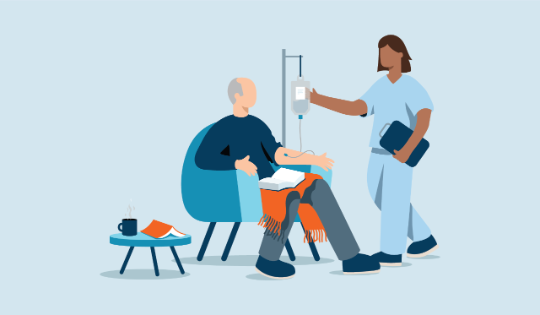

Clinical trial results for
previously untreated advanced liver cancer
For adults with a type of liver cancer called hepatocellular carcinoma that cannot be removed by surgery or has spread


Clinical trial results for
previously untreated advanced liver cancer
For adults with a type of liver cancer called hepatocellular carcinoma that cannot be removed by surgery or has spread
Actor portrayals.
In a clinical trial of 668 people with previously untreated advanced liver cancer, 335 people were given OPDIVO + YERVOY and 333 people were given a targeted therapy, either lenvatinib or sorafenib, chosen by the investigator. This is what’s known as investigator’s choice of therapy.
Half the people were alive
Half the people were alive
In the primary analysis with a median follow-up of 35 months, people given OPDIVO + YERVOY had a 21% lower risk of dying than those given lenvatinib/sorafenib.
OPDIVO + YERVOY |
Lenvatinib/sorafenib |
Tumors disappeared completely (complete response)
Tumors shrank (partial response)
Tumors shrank or disappeared completely (overall response)
Half of the people who responded (complete or partial) to OPDIVO + YERVOY continued to respond for at least 30.4 months compared to 12.9 months for people given lenvatinib or sorafenib.
Words to know
Overall response rate is the percentage of patients who responded to treatment. These patients saw their tumors either shrink or disappear completely.
Partial response is when a tumor reacts to treatment and shrinks.
Complete response is when a tumor reacts to treatment and disappears completely. This is the disappearance of any measurable tumors in response to treatment. This does not mean the cancer has been cured.
Duration of response is the measure of how long these responses lasted. The median duration of response is the length of time half of the patients were still responding to treatment.
OPDIVO + YERVOY will not work for everyone. Individual results may vary.
See your recommended treatment plan and what to expect from an infusion
For adults with advanced liver cancer (hepatocellular carcinoma)
OPDIVO® (nivolumab) is a prescription medicine used in combination with YERVOY® (ipilimumab) as a first treatment for adults with a type of liver cancer called hepatocellular carcinoma that cannot be removed by surgery or has spread.
It is not known if OPDIVO is safe and effective in children younger than 12 years of age with melanoma or MSI-H or dMMR metastatic colorectal cancer.
It is not known if OPDIVO is safe and effective in children for the treatment of any other cancers.
OPDIVO (10 mg/mL) and YERVOY (5 mg/mL) are injections for intravenous (IV) use.






